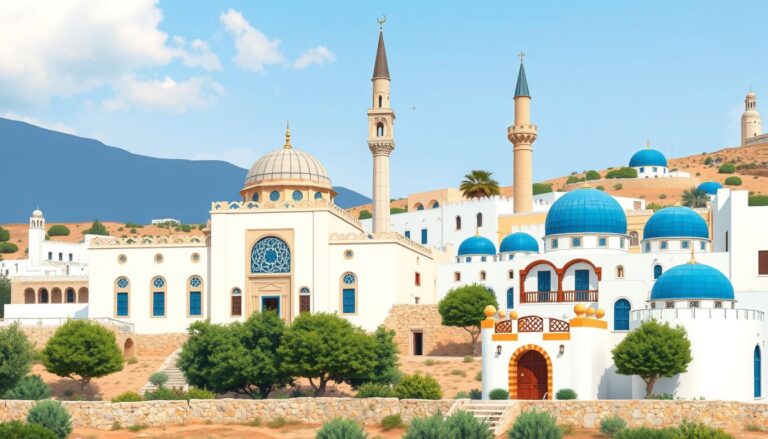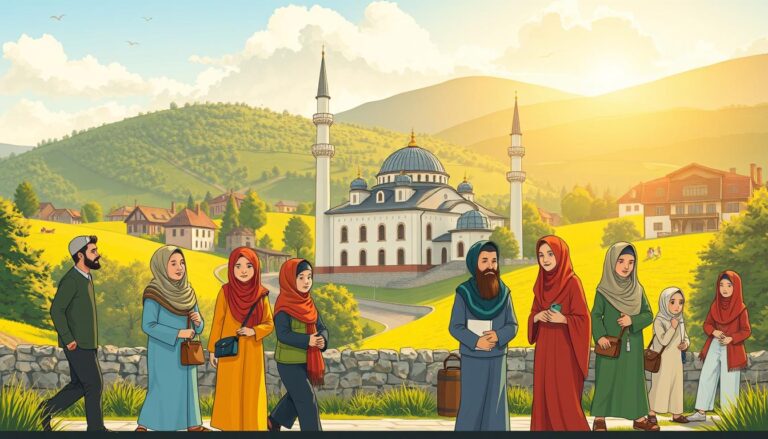Islam in Sweden
In 2017, Sweden had a Muslim population of 810,000 people, representing a staggering 8.1% of the total population of the country. This significant presence of Islam in the Scandinavian nation is a testament to the diversity and evolution of Sweden’s religious landscape over the past decades.
The history of Islam in Sweden dates back to the 7th-10th centuries, when the Vikings traded extensively with the Muslim world during the Islamic Golden Age. However, the modern Swedish Muslim community has largely grown through immigration from the Middle East, Balkans, and parts of Africa since the late 1960s. Today, Sweden boasts a diverse and heterogeneous Muslim population, with estimates ranging from 300,000 to over 800,000 people, making up around 6-8% of the total population.
The establishment of mosques and Islamic institutions across the country has helped facilitate the growth and integration of these Islamic communities in Sweden. As the Muslim population continues to evolve, the influence of Islamic culture and Islamic practices has become increasingly prominent, shaping the social fabric and political discourse in the nation.
Key Takeaways
- Islam has had a presence in Sweden dating back to the 7th-10th centuries, with a significant growth in the modern era through immigration.
- Sweden’s Muslim population is estimated to be between 6-8% of the total population, with a diverse and heterogeneous community.
- The establishment of mosques and Islamic institutions has played a crucial role in the growth and integration of Muslim communities in Sweden.
- The influence of Islamic culture and practices has become increasingly prominent, shaping the social and political landscape in the country.
- The securitization of Islam in Sweden has contributed to the rise of anti-Islamic sentiment and political debates around the issue.
Historical Background
Sweden’s history has long been intertwined with the Islamic world. Archaeological findings reveal that the country had contacts with the medieval Islamic civilizations dating back to the 7th-10th centuries. Pre-Islamic Arabic coins have been discovered at Iron Age burial sites, indicating that the Vikings engaged in trade with the Islamic world during this period.
The first registered Muslim groups in modern Sweden were Finnish Tatars who emigrated from Finland and Estonia in the 1940s. However, the Muslim population remained relatively small until the 1970s, when immigration from the Middle East began to increase.
Early Contacts with the Muslim World
The discovery of pre-Islamic Arabic coins in Sweden’s Iron Age burial sites suggests that the Viking contacts with the Islamic world existed centuries before the arrival of the first registered Muslim communities. This trade and cultural exchange between the Nordic region and the medieval Islamic civilizations provide insights into the history of Islam in Sweden.
“The presence of these coins in Sweden is a testament to the extensive trade networks that existed between the Viking world and the Islamic empires during the Middle Ages.”
The pre-Islamic Arabic coins in Sweden found at archaeological sites offer a glimpse into the complex cultural and economic interactions that took place between the Nordic and Islamic regions long before the modern era.
Modern Muslim Immigration
The Muslim population in Sweden has grown significantly since the late 1960s and 1970s due to immigration from the Middle East, Balkans, and parts of Africa. Waves of immigrants have come to Sweden from the former Yugoslav republics, as well as more recently from Somalia. This influx of immigrants has been the main driver behind the spread of Islam in the country, with the Muslim population estimated to have grown from around 300,000-350,000 in 2000 to over 800,000 by 2017, making up around 8% of Sweden’s total population.
According to the analysis of state-Islam relations in Sweden, it is identified that Sweden deviated from the common pattern of when, how, and why state-Islam relations were established in Europe. The article indicates that Sweden bypassed the initial phase of “Embassy Islam” (1960–1990) and directly moved to the phase of institutionalizing domestic relations with Muslim councils in the mid-1970s.
“Europe experienced a paradigm shift in approaching residents following the Islamic faith from 1989 onwards, moving towards incorporating and domesticating Muslim populations.”
After 1989, European states aimed to reassert state control over transnational Muslim networks, leading to the establishment of Muslim councils to act as brokers between Embassy Islam and Political Islam, seeking to assert national sovereignty. This development of state-established Muslim councils post-1989 is viewed as a neo-corporate strategy, akin to historical trade union-oriented neo-corporatism.
The growth of the Muslim population in Sweden has been a significant demographic shift, with the number of Muslim immigrants from the Middle East, Balkans, and parts of Africa steadily increasing over the past few decades. This trend has had a substantial impact on the country’s social, cultural, and political landscape.
Establishment of Mosques
Sweden has a growing number of mosques that serve as vital hubs for the country’s diverse Muslim communities. The first mosque, the Nasir Mosque, was built in Gothenburg in 1976 by the Ahmadiyya movement. This was followed by the Malmö Mosque in 1984 and the Uppsala Mosque in 1995. During the 2000s, many more mosques were constructed across Sweden, including the Stockholm Mosque and the Fittja Mosque.
The construction of mosques in Sweden has often been a subject of debate and controversy. While the governments of Saudi Arabia and Libya have provided financial support for some of the largest mosques in the country, the Swedish Muslim community has also faced organizational and financial challenges in obtaining permits and building new places of worship.
Mosques in Sweden tend to be either mono-ethnic or mono-denominational, reflecting the heterogeneous nature of the Muslim population. However, in towns with a smaller Muslim presence, there is more cooperation between different groups. The role of mosques in Swedish Muslim communities is multifaceted, serving as not only places of worship but also community centers, educational institutions, and hubs for social and cultural activities.
One of the largest and most prominent mosques in Sweden is the Stockholm Mosque, also known as Zayed bin Sultan Al Nahyan’s Mosque. Inaugurated in 2000, the mosque can accommodate up to 2,000 worshipers and has faced its share of controversies, including allegations of anti-American sentiments and the sale of antisemitic content in its bookshop.
Despite the challenges, the establishment of mosques in Sweden reflects the growing role of Islam in the country’s religious landscape. As the Muslim population continues to evolve, the role of mosques in shaping the social, cultural, and political dynamics of Swedish society will likely continue to be a topic of ongoing discussion and debate.
Demographics and Growth
While there are no official statistics on the Muslim population in Sweden, estimates suggest the number has grown significantly in recent decades. In the early 2000s, it was estimated that around 3.5% of Sweden’s population, or 300,000-350,000 people, had a Muslim background. By 2014, this figure had risen to an estimated 6% of the population, or around 600,000 individuals.
More recent data from 2017 indicates the Muslim population in Sweden has continued to grow, reaching approximately 810,000 people, or 8.1% of the country’s total population of 10 million. This significant increase in the Muslim population has been largely driven by immigration from the Middle East, Balkans, and Africa.
Population Estimates
The growth of the Muslim population in Sweden is part of a broader trend observed across Europe. In mid-2016, the Muslim population in Europe was estimated at 25.8 million, constituting 4.9% of the overall population, up from 19.5 million (3.8%) in 2010. Under a “medium” migration scenario, Muslims could reach 11.2% of Europe’s population by 2050, while a “high” migration scenario could see Muslims make up 14% of the continent’s population by the same year.
In Sweden specifically, the Muslim population is projected to continue growing, potentially reaching 31% of the total population by 2050 under a high migration scenario. This rapid demographic shift has raised concerns and discussions around integration, social cohesion, and the future of Sweden’s identity.
Islam in Sweden
Sweden’s diverse Muslim communities have faced a range of challenges when it comes to integration and acceptance within the broader society. Incidents of Islamophobia, such as mosque attacks and Quran burnings, have occurred, reflecting a concerning rise in anti-Islamic sentiment among some segments of the Swedish population.
Many Muslim youth in Sweden have reported experiencing discrimination, with some even avoiding openly sharing their religious affiliations on social media due to fears of ridicule or backlash. Additionally, some Muslim politicians have faced intense scrutiny and backlash for expressing views that are perceived by some as conflicting with traditional Swedish values.
Navigating Challenges and Fostering Inclusion
The integration of Muslim communities in Sweden remains an ongoing process, with both successes and continued challenges. Efforts to promote interfaith dialogue, combat Islamophobia, and ensure equal opportunities for Muslim Swedes are crucial in addressing the issues facing these communities.
- Increased incidents of mosque attacks and Quran burnings have heightened tensions and concerns within the Muslim community.
- Muslim youth often feel the need to conceal their religious identity to avoid discrimination and social stigma.
- Muslim politicians have faced backlash for expressing views that are perceived as conflicting with Swedish societal norms.
Despite these challenges, there are also examples of successful integration and mutual understanding. Continued work to foster inclusive policies, promote interfaith dialogue, and address issues of Islamophobia and discrimination will be crucial in shaping the future of Muslim communities in Sweden.
“The integration of Muslim communities in Sweden remains an ongoing process, with both successes and continued challenges.”
Incidents and Controversies
Rosengård Riots
The Rosengård district of Malmö, Sweden, witnessed a series of riots in 2008 that highlighted the ongoing tensions between Muslim communities and the authorities. The unrest began when the landlord did not renew the contract for a local mosque’s premises. Angered youths occupied the mosque for three weeks, leading to confrontations with the police that involved pipe bombs, rocks, and the burning of cars and other property. The riots escalated, drawing protesters from other cities, before community leaders intervened to calm the situation.
This incident demonstrated the potential for conflict between Muslim communities and the authorities in Sweden. The Rosengård riots underscored the challenges surrounding the integration of Muslim immigrants and the need for open dialogue and understanding between all parties involved.
“The Rosengård riots highlighted the tensions and potential for conflict between Muslim communities and authorities in Sweden.”
In the aftermath of the Rosengård riots, the government and local authorities recognized the importance of addressing the underlying issues that led to the unrest. This included improving communication, enhancing social services, and fostering greater integration within the communities. However, the incident served as a stark reminder that more work is needed to bridge the divide and ensure a harmonious coexistence between Muslim communities and the broader Swedish society.
Political Discourse and Debates
Islam in Sweden has become a prominent political issue, with some right-wing and populist parties taking increasingly anti-Islamic stances. Leaders like Jimmie Åkesson of the Sweden Democrats have called for the destruction of mosques and the banning of Islamic symbols, while other politicians have made controversial statements equating Muslims with potential “criminals or terrorists.” This rhetoric has contributed to the securitization of Islam in Sweden, fueling Islamophobia and making life more challenging for Muslim citizens and communities.
The Sweden Democrats (SD) have gained significant political influence in recent years, becoming the second-largest party in the 2022 Swedish general election with 20.5% of the votes. Their electoral support has grown substantially, from just 1.4% in 2002 to 12.9% in 2014. The party’s anti-Islamic stance is reflected in the words of its leader, Jimmie Åkesson, who has referred to Islam and Muslims as “the biggest foreign threat since World War II.”
The rise of the Sweden Democrats has been linked to the increased politicization and salience of immigration in Sweden, particularly due to the influx of asylum seekers in recent years. The party’s rhetoric portrays Muslims not only as a threat to democratic ideals but also as physical threats to law and order, contributing to their anti-Islamic stance.
Research indicates that members of the Sweden Democrats hold significantly more negative views towards Muslims and individuals with foreign names than voters of other Swedish parties. This anti-Islamic rhetoric has had a tangible impact on Muslim communities, contributing to a sense of marginalization and hostility.
“The party leader of the Sweden Democrats, Jimmi Åkesson, has referred to Islam and Muslims as ‘the biggest foreign threat since World War II’, reflecting the party’s stance on the issue.”
The political debates around Islam in Sweden have become increasingly polarized, with the rise of anti-Islamic rhetoric from right-wing and populist parties, such as the Sweden Democrats. This has had a significant impact on Muslim communities, contributing to a climate of Islamophobia and making their integration and acceptance more challenging.
Social Implications
The growing Muslim population in Sweden has had significant social implications, both for the Muslim communities and Swedish society as a whole. Some Muslim youth report feeling the need to hide their religious affiliations to avoid discrimination, while mosques have faced incidents of Islamophobic vandalism and attacks.
At the same time, the presence of diverse Muslim communities has contributed to Sweden’s evolving cultural landscape. However, tensions and polarization around these changes remain an important challenge to manage. The social impact of Islam in Sweden, including changes to Swedish society and the experiences of the Muslim community, continue to be crucial areas of focus.
“Many variables were found to affect attitudes towards Muslims, including country of birth, socio-economic background, school factors, socio-psychological factors, friendship relationships, gender role perceptions, and local/regional factors like high unemployment and immigrant presence.”
A study analyzing the attitudes of 9,498 non-Muslim youths aged 15-19 in Sweden provided valuable insights. The findings underscored the complex interplay of factors shaping perceptions towards the Muslim community. As the Muslim population in Sweden has grown from 100,000 in the late 1980s to approximately 350,000 individuals today, understanding these dynamics is crucial for promoting social cohesion and integration.
The impact of Islamophobia on Muslim women in Sweden is also an area of concern. According to a national report, Muslim women commonly face physical and verbal attacks, harassment, and violence, leading to limited social mobility and hindered ambitions in employment and public participation. Quantifying knowledge on this issue is crucial for addressing power relations and improving policies and social conditions.
International Relations
Sweden’s growing Muslim population and the securitization of Islam in the country have had significant implications for its international relationships, particularly with predominantly Muslim nations. Events such as the Quran burning protests that disrupted Sweden’s NATO talks with Turkey demonstrate the sensitivity of these issues on a global scale.
Moreover, the financial support from Saudi Arabia and Libya for the construction of major mosques in Sweden highlights the international dimensions of the country’s evolving religious landscape. These developments have sparked debates about Sweden’s role in the Muslim world and the impact of global events on Muslim communities within its borders.
- Sweden has a population of about 10.5 million inhabitants, with approximately 20% born abroad and over 14% coming from countries outside the European Union.
- An estimated 800,000 Swedes have Muslim religious or cultural backgrounds, representing a significant portion of the population.
- The terror threat level in Sweden has been raised to “high,” the fourth on a five-point scale, due to concerns about the impact of global events on Muslim communities in the country.
The Quran burning protests have had far-reaching consequences, leading to over 300 incidents, more than half considered severe, resulting from riots, vandalism, and violence. Investigations are ongoing regarding tens of suspects related to these incidents, highlighting the complex interplay between Sweden’s international relationships and its domestic Muslim community.
“The impact of global events on Muslim communities in Sweden has been significant, with the Quran burning protests disrupting the country’s NATO talks with Turkey and sparking international debates about Sweden’s role in the Muslim world.”
As Sweden continues to navigate the evolving dynamics of its Muslim population and their international connections, the country’s international relationships and its ability to address the challenges faced by its Muslim communities will be crucial in shaping its future.
Future Outlook
As the Muslim population in Sweden continues to grow, the country faces both challenges and opportunities in shaping the future integration and acceptance of its Islamic communities. Addressing rising Islamophobia and political rhetoric that securitizes Islam will be crucial, as will fostering greater social cohesion and understanding.
Despite the challenges, the diversity of Muslim Swedes presents possibilities for Sweden to embrace its evolving cultural identity and leverage the contributions of its Muslim citizens. Managing these dynamics will be key to determining the role of Islam in Swedish society going forward.
Challenges Facing Muslim Communities
- Addressing Islamophobia and negative perceptions of Islam as incompatible with democracy
- Combating the rise of far-right political parties and xenophobic sentiments
- Overcoming barriers to permanent residency and citizenship for Muslim immigrants
- Reducing hate crimes and discrimination targeting Muslim and minority populations
Opportunities for Integration and Acceptance
- Promoting cultural exchange and understanding between Muslim and non-Muslim Swedes
- Leveraging the skills and talents of the growing Muslim population to contribute to Sweden’s economy and society
- Embracing the evolving diversity of Sweden’s national identity and celebrating the contributions of Muslim Swedes
- Developing inclusive policies and programs that foster social cohesion and belonging for all citizens
As Sweden navigates the future of Islam within its borders, addressing both the challenges and seizing the opportunities will be crucial to shaping a more inclusive and harmonious society.
“The future of Islam in Sweden is not just about demographics, but about how we as a society choose to respond to the changing face of our nation. It’s a test of our values, our compassion, and our ability to adapt to a more diverse future.”
Conclusion
As we conclude this examination of Islam’s presence in Sweden, it is clear that the country has a longstanding and multifaceted relationship with the Muslim faith and its adherents. From historical contacts to modern-day immigration, the integration of Muslim communities has presented both opportunities and challenges for Swedish society.
While Sweden has generally avoided restrictive policies targeting religious practices, the growth of the Muslim population has nonetheless sparked political debates and controversies. Issues of security, identity, and social cohesion have all come to the forefront, underscoring the overall significance of Islam in Sweden’s evolving landscape.
Moving forward, it will be crucial for Sweden to balance concerns over integration and radicalization with the recognition of the valuable contributions that Muslim communities can make to the country’s future. By fostering an environment of mutual understanding and respect, Sweden has the potential to serve as a model for the successful integration of diverse religious and cultural perspectives within a modern, pluralistic society.
Source Links
- Islam in Sweden
- A Social, Political, or Security Issue?
- Concern grows over anti-Muslim hate incidents in Sweden
- In Sweden, burning Qur’ans threaten to send the country’s history of tolerance up in smoke
- Islamophobia in Sweden
- Islam in Sweden –
- No title found
- From “People’s Home” to “Multiculturalism”: Muslims in Sweden
- Sweden – United States Department of State
- Stockholm Mosque
- Europe’s Growing Muslim Population
- Muslims Will Become Majority in Swedish Cities in Just 1 Generation, Boasts Pakistani-Born Theologian [incl. Yasir Qadhi]
- How Quran burnings in Sweden have increased threats from Islamic militants
- Sweden blames Iran for cyber-attack after Quran burnings
- The Uncomfortable Truth about Malmö, Sweden – The Host of the European Song Festival
- ‘It’s a racism crisis’: call for action on Qur’an burnings in Sweden
- Why Sweden and Denmark React Differently to Quran Desecrations
- Burning The Quran in Sweden: Hatred or Freedom?
- The Rise of Sweden Democrats: Islam, Populism and the End of Swedish Exceptionalism
- The Far-Right Sweden Democrats and the Construction of the Muslim Other
- Young people’s attitudes towards Muslims in Sweden
- Koran burnings put Sweden’s global stature at stake – GIS Reports
- Facts about migration, integration and crime in Sweden
- The Future of the Global Muslim Population
- Islamophobia is on the Rise in Sweden – Berkeley Political Review
- Comparing Integration of Muslims in Europe: The Cases of the Netherlands and Sweden
- Islamic Takeover and Selling Out Sweden
- The social values of newly arrived immigrants in Sweden







